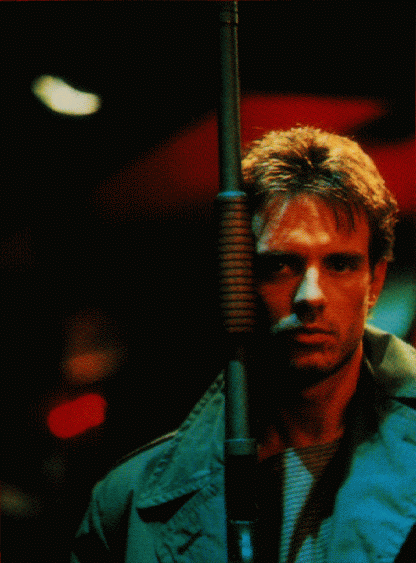1) Kyle Reese shoots the T-800 through a plate glass window (The Terminator)
 Deep within Reagan’s America, when we feared our own technology would destroy humanity, a strange, dark film appeared, featuring a stone-faced villain whom the heroes could not defeat, a hero who could only hope to keep running, and a heroine who couldn’t understand her predicament. Pretty accurate summation of Eighties America, really.
Deep within Reagan’s America, when we feared our own technology would destroy humanity, a strange, dark film appeared, featuring a stone-faced villain whom the heroes could not defeat, a hero who could only hope to keep running, and a heroine who couldn’t understand her predicament. Pretty accurate summation of Eighties America, really.When Reese (Michael Biehn) opens up with a sawed-off shotgun, the T-800 (Arnold Schwarzenegger) initially isn’t even phased. Several direct thoracic blows leaves it momentarily stunned enough to collapse through a giant window. Reese takes that moment to speak his iconic line to Sarah Connor (Linda Hamilton): “Come with me if you want to live.”
Which proves appropriate when, after momentary disorientation, the machine rises, apparently unhurt, and charges its targets. It will subsequently survive shooting, car crashes, open flame, falling from its motorcycle to get hit by a truck, and a diesel explosion before being crushed by a fellow machine. Who says science fiction doesn’t symbolize its culture?
2) Virgil Tibbs slaps Eric Endicott back (In the Heat of the Night)

Interviewed years later, Sidney Poitier revealed that the original script required his Detective Tibbs to back down when backhanded by white plantation owner Endicott (Larry Gates), but Poitier himself objected. Why would a seasoned homicide detective accept such treatment? So the two actors improvised their exchange of slaps right there on set.
This proved wise. While black field hands pick Endicott’s cotton, the owner plays with orchids in his greenhouse. In Mississippi at that time, a black man in the master’s house would have been a serious invasion. But the whole story represents new justice invading the old South. Tibbs’ hot-headed slap announces that, in this new era, such treatment will face consequences.
3) Private Pyle shoots Sgt. Hartman (Full Metal Jacket)
 Vincent D’Onofrio as Pvt. Leonard Lawrence, almost unrecognizable under seventy added pounds, poses an important question: is he intellectually disabled, or has DI Hartman (R. Lee Ermey) broken him? More important, does it matter? If Lawrence, nicknamed “Gomer Pyle” by Hartman, can’t handle Parris Island, how can he possibly handle Vietnam?
Vincent D’Onofrio as Pvt. Leonard Lawrence, almost unrecognizable under seventy added pounds, poses an important question: is he intellectually disabled, or has DI Hartman (R. Lee Ermey) broken him? More important, does it matter? If Lawrence, nicknamed “Gomer Pyle” by Hartman, can’t handle Parris Island, how can he possibly handle Vietnam?Recruits knew that, if their boots hit Vietnamese soil, they’d see themselves used as human targets. Before satellite targeting, infrared, and GPS, officers habitually lined men up and had them march forward until someone shot them, and they knew where to direct their fire. Perhaps Pyle knew that, and wanted to end everything on his terms, not the Corps’s.
Unfortunately, Gustav Hasford’s novel The Short-Timers is long out of print, so we don’t know his intent. But in Stanley Kubrick’s nihilistic rendering, intent seems secondary. Soldiers are defined by their actions. Gunny Hartman wants to turn Pyle into a hardened killer, and in the final analysis, he succeeds beyond his wildest dreams.
4) Ripley descends into the hive to rescue Newt (Aliens)
 Ellen Ripley isn’t an admirable hero because a woman plays the men’s game. She’s admirable because she’s a woman, with everything that entails. When the marines flee the monsters, which pounce as relentlessly as whack-a-mole puppets, Ripley keeps her family intact. The men disintegrate in terror; only Ripley has the fortitude to count noses.
Ellen Ripley isn’t an admirable hero because a woman plays the men’s game. She’s admirable because she’s a woman, with everything that entails. When the marines flee the monsters, which pounce as relentlessly as whack-a-mole puppets, Ripley keeps her family intact. The men disintegrate in terror; only Ripley has the fortitude to count noses.So when Ripley straps a flashlight to her rifle and descends into a facehugger hive to retrieve her surrogate daughter, Newt, she doesn’t represent some “last stand” spaghetti western hero. She’s a woman, protecting her family. Unfortunately, so is the alien queen. One must lose everything. After all, the queen only wants a family, too.
5) Raymond Shaw turns his rifle on himself (The Manchurian Candidate)
 This surprising act of violence after what had been a dry political satire seems initially jarring. Though Shaw’s suicide isn’t the first violent death, its close focus immediacy announces that jokes have ended. This topic, the movie announces, is too serious, too vital to our fundamental freedoms.
This surprising act of violence after what had been a dry political satire seems initially jarring. Though Shaw’s suicide isn’t the first violent death, its close focus immediacy announces that jokes have ended. This topic, the movie announces, is too serious, too vital to our fundamental freedoms.Bennett Marco (Frank Sinatra) believes he beat the conditioning that previously handicapped Raymond Shaw (Laurence Harvey). But Shaw knows better: not that he can’t overcome the conditioning, but that he faces an enemy overwhelming in number and ruthless in ambition. When Shaw says “You couldn’t have stopped them, so I had to,” we ask: who? And are they still out there?
In order to fit this list into space parameters, I had to break it in two. Those interested in the second half may read it here.
No comments:
Post a Comment